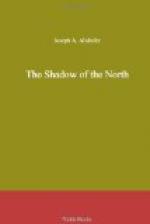Willet’s own eyes twinkled as he spoke, and he saw also that there was a light in those of the big Dutchman. But Huysman would admit nothing.
“Here iss your room,” he said to Robert and Tayoga.
Robert saw that it was not changed. All the old, familiar objects were there, and they brought to him a rush of emotion, as inanimate things often do. On a heavy mahogany dresser lay two worn volumes that he touched affectionately. One was his Caesar and the other his algebra. Once he had hated both, but now he thought of them tenderly as links with, the peaceful boyhood that was slipping away. Hanging from a hook on the wall was an unstrung bow, the first weapon of the kind with which he had practiced under the teaching of Tayoga. He passed his hand over it gently and felt a thrill at the touch of the wood.
Tayoga, also was moving about the room. On a small shelf lay an English dictionary and several readers. They too were worn. He had spent many a grieving hour over them when he had come from the Iroquois forests to learn the white man’s lore. He recalled how he had hated them for a time, and how he had looked out of his school windows at the freedom for which he had longed. But he was made of wrought steel, both mind and body, and always the white youth, Lennox, his comrade, was at his elbow in those days of his scholastic infancy to help him. It had been a great episode in the life of Tayoga, who had the intellect of a mighty chief, the mind of Pontiac or Thayendanegea, or Tecumseh, or Sequoia. He had forced himself to learn and in learning his books he had learned also to like the people of another race around him who were good to him and who helped him in the first hard days on the new road. So the young Onondaga felt an emotion much like that of Robert as he walked about the room and touched the old familiar things. Then he turned to Huysman.
“Mynheer Jacobus,” he said, “you have a mighty body, and you have in it a great heart. If all the men at Albany were like you there would never be any trouble between them and the Hodenosaunee.”
“Tayoga,” said Huysman, “you haf borrowed Robert’s tongue to cozen und flatter. I haf not a great heart at all. I haf a very bad heart. I could not get on in this world if I didn’t.”
Tayoga laughed musically, and Mynheer Jacobus gruffly bidding them not to destroy anything, while he was gone, departed to see that Caterina, the Dutch cook, fat like her master, should have ready a dinner, drawing upon every resource of his ample larder. It is but truth to say that the heart of Mynheer Jacobus was very full. A fat old bachelor, with no near kin, his heart yearned over the two lads who had spent so long a period in his home, and he knew them, too, for what they were, each a fine flower of his own racial stock.
They were to remain several days in Albany, and after dinner they visited Alexander McLean, the crusty teacher who had given them such a severe drilling in their books. Master McLean allowed himself a few brief expressions of pleasure when they came into his house, and then questioned them sharply:




